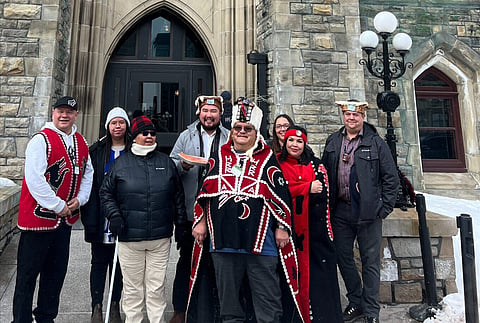

Chiefs and leaders of the Coalition of First Nations for Finfish Stewardship (FNFFS) went to the Canadian Parliament on behalf of those indigenous communities in British Columbia whose territories have salmon farming. There, they asked for no more salmon farm closures in those BC indigenous territories where communities do want them. Their goal during this visit to Canada's capital is to meet with federal decision-makers and discuss the importance of the sustainable salmon farming industry in the region.
During their appearance in the Canadian capital, First Nations belonging to the Coalition also wanted to emphasize "the negative impact of current federal government policy decisions to remove salmon farms on Indigenous rights and title issues, food security, affordability, jobs, and reconciliation in rural, coastal and Indigenous communities".
Indigenous community members of the FNFFS said they are united in their disappointment over the recent decision by Joyce Murray, Canada's Minister of Fisheries, Oceans and Coast Guard, to disrespect the sovereign authority of the Laich-kwil-tach First Nations of the Discovery Islands to decide whether they want to practice sustainable finfish aquaculture in their traditional waters. They have repeated a message they had already made clear even before the decision was known. "We must have a say on how, if and what kind of salmon farming can and should take place in our territories", stated once again Chris Roberts, Chief Councillor Elect of the Wei Wai Kum First Nation.
"After the disrespectful and damaging decision to close salmon farms in my territory in the Discovery Islands without consent of Rightsholder First Nations, we as a Coalition can no longer trust that Minister Murray can deliver a thoughtful, unbiased transition plan for the remaining salmon farms in the sovereign territories of Nations that wish to host them", he continued. "It makes no sense that the Government of Canada is trying to shut down any sustainable salmon farming supported by Nations when DFO's own science says just that – it is sustainable. We call on Prime Minister Trudeau and his entire Cabinet to ensure a clear and transparent transition process with a new and unbiased Minister who understands our issues and respects reconciliation, science, the environment and the economy for everyone".
Chief Roberts went even further, making clear First Nations' commitment to sustainability. "We are the original environmentalists, not the fancy downtown activists", he said. "We have stewarded wild salmon for thousands of years, and our guardians and monitors continue to protect it. We protect the wild salmon while at the same time exploring opportunities of a growing sustainable salmon farming industry that supports the future of our communities in keeping with the laws and traditions of our people".
The FNFFS chiefs and leaders who spoke today on Parliament Hill were mostly dressed in traditional indigenous garb and remarked that this was not a setting to which they were accustomed. The solemnity of their dress and words seemed to emphasize the importance of the issue at hand and not only as it affects their communities, but all Canadians.
As they recalled in the release issued after the declaration, to date 40% of the salmon farms in British Columbia waters have already been removed. As a result, coastal communities where jobs are lost are the most affected, but actually, the decision has also resulted in the increased cost of farmed salmon for all Canadian families, as well as an increased carbon footprint from the air transport of farmed salmon from other countries, such as Chile or Norway.
"We are very worried, and Canadians should be worried too", said Isaiah Robinson, Councillor of the Kitasoo Xai'xais Nation. "Minister Murray is on a path to reduce or eliminate salmon farming in Canada. She is ignoring the science of her own department. She is ignoring our voices, and has demonstrated she can't be trusted".
"Canadians in any resource industry would resent their jobs being wiped out by the bias of one Minister in Ottawa, especially when there are no new jobs in their communities to replace them", he continued. And added, "Like other Canadians, we want our people to have good jobs. And like other Canadians, we want families to be able to afford healthy food. These government policies are making salmon more expensive for everyone".
The BC Coalition of First Nations for Finfish Stewardship did not want to leave any loose end in its statement. In addition to the claim of their indegenous rights, the science and the economic consequences, they have not forgotten those who advocate that the solution is land-based salmon farms.
Many groups against marine salmon farms have called on Minister Murray to force all fish farms to be land-based. However, according to the FNFFS, the latest feasibility reports reaffirm that large-scale land-based salmon farming is not yet economically or technologically viable in BC.
"Land-based is not possible in these Nations' territories. The B.C. government conducted its own feasibility study on whether it is viable, and it is not", claimed Albert Charlie, Hereditary Chief and Councillor of the Gwa'sala-'Nakwaxda'xw Nation. "Forcing First Nations to 'transition' to land-based technology that isn't ready means they will lose the industry completely and their communities will be devastated", he added.
Still, the Coalition wanted to make it clear that it understands that other nations want a different path for salmon farming. In fact, some of them are also currently in Ottawa to present their input on the transition of the sector. "We invite our fellow Nations to sit down together on this issue, Nation-to-Nation, while visiting the territory of the Anishinaabe Algonquin Nation", said Hereditary Chief Harvey Robinson of the Kitasoo Xai'xais Nation. "Let's listen to one another – and respect one another, we all want to do what's best for our own territories", he concluded.
